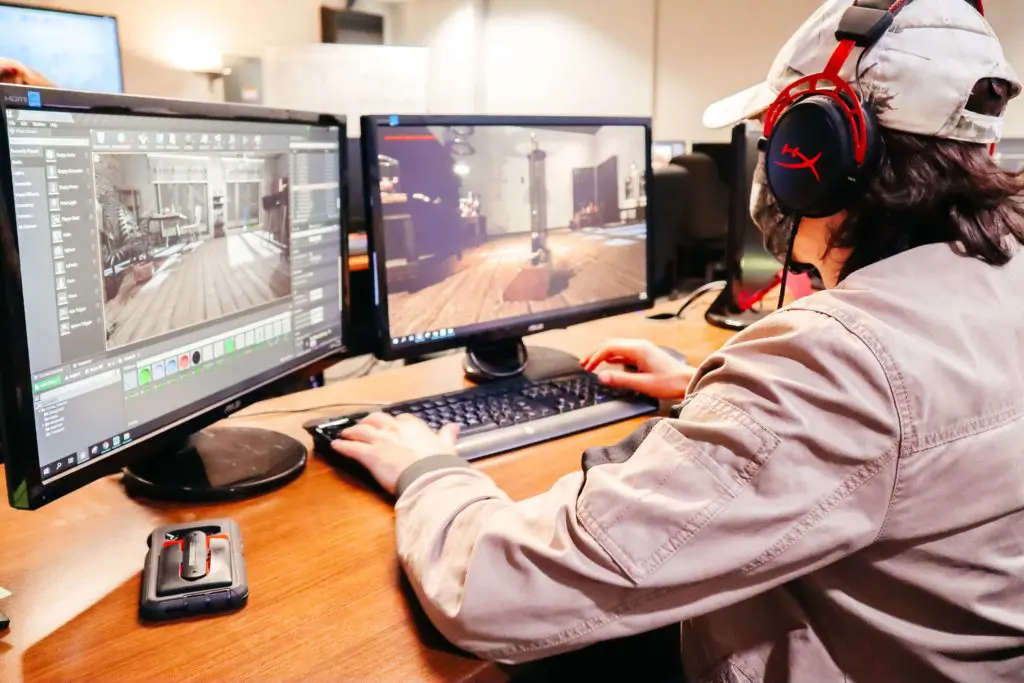Video games are now the leading form of entertainment in the world. Join the winning team by becoming a game artist. All you need is a passion for games and the right game plan.
Why Does Someone Become A Game Artist?
According to a recent Marketwatch article from December 2020, the revenue for the videogame industry was expected to surge 20% to $179.7 billion dollars. This would make videogames, the largest entertainment industry in the world, larger than the film industry and all of the North American sports industries combined.
Whether it’s bringing new and exciting worlds to life, creating strange alien creatures, helping tell stories through game cinematics or developing virtual worlds, everyone has their own reasons for becoming a game artist. The games industry feeds on passion. Being able to show a studio that you’re passionate about creating games is an integral part of landing that first game artist job.
A Passion for Creativity
Like other forms of entertainment, the only limit to video games is the creativity of the team behind them. Your creativity is allowed to run wild when you are tasked with bringing a whole world to life. Games showcase a variety of different art forms that work together to help tell their story. Whether you are into animation, 3D modeling, visual effects, writing or music, there are roles in game development that will let you express your creativity.
The Desire to Learn and Grow
If you love learning and have a desire to obtain many skills, then game development is a good opportunity for you to quench this thirst for knowledge. There are always new tools and techniques to learn. Keeping up with the technological advances that are constantly being made will help to ensure that you remain a viable, employable artist for years to come.
How Do You Become a Game Artist?
Learning the Language*
The game industry has a wide array of game art jobs available. Positions include but aren’t limited to: environment artist, character artist, lighting artist, animator, technical artist, art directors, creative directors and many more. With so many paths to choose from, learning how they are all connected and dependent on one another is an important step.
There is an underlying language that permeates all games and developers use this artistic language to communicate with players. You must learn how good games work and why, understand the terminology behind game engine development, and recognize the foundations that good games are built upon. Once you have this knowledge, you become a much more valuable member of any game development team.
Art is subjective and art styles are something that change, but one thing that remains consistent is the need for the game artist to work well with other people on the development team. Being able to provide good feedback, accept constructive criticism and learning how to communicate well with others are the types of skills needed to make a difference as a game artist.
Enrolling in a Formal Education Program
Higher education provides you the many tools you need to be successful, as well as surrounds you with a core group of likeminded individuals who all share the same goals and passion that you do for the industry. The popularity of video games has also given rise to dedicated education programs that feature curriculums specific to becoming a game artist.
However, the skills you learn as a game artist are all skills that allow you to branch out into a myriad of industries that are adopting video game technology. From virtual production in the film industry, to military simulation, virtual reality, themed entertainment and automotive, the need for artists with game engine experience has never been higher. Any of these disciplines will give you the ability to switch mediums throughout your career.
The biggest advantage to formal education is the real-world experience with qualified instructors. This gives you a chance to learn the actual tools and techniques used to create the latest games, films, and TV shows. You also get to learn from instructors who’ve worked on many different game titles and genres. The insight they offer is far more reliable and will take you farther than any information presented on the Internet.
Finally, the most important advantage to an educational setting that mimics a real game studio is teamwork. No other skill is as important to game development or any kind of creative production for that matter, than teamwork. Working in a collaborative environment and solving problems in real-time with a team, all while operating under deadlines and milestones that mimic actual game development will teach you the important skills that all studios look for when hiring new game artists.
Want to Learn More?
Ready to learn more about becoming a game artist? During the Game Production diploma program at DAVE School, you will work together with fellow students and instructors to create a new and exciting game experience.
Model, texture, animate, layout and light your own interactive worlds and game levels in Unreal Engine and bring them to life in a real production environment.
Finish the game production program career ready with a demo reel sure to impress any AAA or Indie game studios looking for artists.
Ready to choose your own adventure? DAVE School is here to help. Contact us to learn more about completing the Visual Effects Production Diploma Program at DAVE School.
*These examples are intended to serve only as a general guide of possible employment opportunities. There are many factors that determine the job an individual may obtain and DAVE School cannot guarantee its graduate any particular job. Some positions may require license or other certifications. We encourage you to research the requirements for the particular position you desire.


